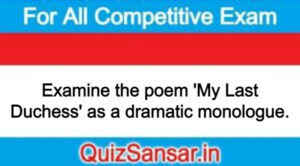
Examine the poem ‘My Last Duchess’ as a dramatic monologue.
Examine the poem ‘My Last Duchess’ as a dramatic monologue.
Ans.
The poem ‘My Last Duchess‘ is a dramatic monologue. It can be said to be an excellent example of the type of poem, of which Browning is the unquestioned master in the English language. It shows the poet’s deep understanding of human character, and capacity to present it dramatically and impressively.
Here, as in the foremost monologues of Browning, the chief character is the speaker himself. It is an Italian nobleman about to marry the daughter. of a rich count, to whose agent he is speaking in the portrait-gallery of his mansion. As he speaks, we are able to understand the character and outlook of the man, our understanding growing as he moves from one phase to another of his relationship with his last Duchess. Browning was always interested in the inner life of men, in the complexity of their souls. While a dramatist like Shakespeare worked with the clay of human action. Browning worked with the clay of human thought. Here the Duke, speaking of his last Duchess, tells us more about himself than about that unfortunate woman.
It was Browning’s method in these dramatic monologues to choose a quintessential moment in the life of his subject, a moment which laid bare his character as in a flash of lightning. He always chose this supreme moment unerringly. Here it is the moment when the envoy has come to conclude negotiations for his next marriage. Naturally his mind must have gone back to his last Duchess and the nature of his relationship with her. The portrait makes the circumstance more significant. Pointing to it and describing it, the Duke touches upon the Duchess’s character and his reaction to it, laying bare, in the process, his supreme egotism, his possessiveness and his cruelty. We feel that no other circumstances could have prompted a more vivid revelation.
Sir, twas all one! My favour at her breast
The dropping of the daylight in the West,
The bough of cherries some officious fool
broke in the orchard for her, the white mule
She rode with round the terrace-all and each
Would draw from her alike the approving speech,
Or blush, at least. She thanked men:-good; but thanked
Somehow….I know not how….as if she ranked
My gift of nine-hundred-years old name
With anybody’s gift
The monologues of browning are always carefully set against scenes clearly suggested. This helps us in the understanding of gestures and remarks by a listener who is always present. Here the count’s envoy is the listener. His presence is suggested by gestures and by words addressed to him. Here we guess that the man has expressed curiosity about the picture behind the curtain. The Duke then draws the curtains and begins to speak about the subject of the portrait. Another query about the smile on the face, and the Duke goes on to speak about the character of his last Duchess and the treatment he meted out to her.
Oh, Sir, she smiled, no doubt,
Whenever I passed her, but who passed without
Much the same smile? This grew, I gave commands;
Then all smiles stopped together
Every words of his reveals the cold-blooded egotist, incapable of the finer human feelings. Then towards the end there is the suggestion that the envoy has stood back, allowing the Duke to precede him down the staircase and as they move down the Duke calls attention to his precious piece of bronze work.
Thus the poem is a perfect example of a dramatic monologue. It is a piece of action, not of still life; yet it is not merely a long speech delivered by a character. It is a dramatic scene in small compass into which is poured all the emotion natural to a character, thus making him revel himself vividly and powerfully.
Dr. Jasbir Jain comments, “The Duke’s possessive passion for collecting object of beauty, his sense of refinement and aristocratic pride do not only contrast with his cruelty and material greed, but also provide in an uncanny way the exploration for it. In a brief span of fifty-six lines the characters of the Duke, his dead with and of the period and delineated very skillfully at times with the help of parenthesis, colloquial action and broken syntax.
-
Write the critical appreciation of the poem No. 12 entitled Far Below Flowed.
-
Write the critical appreciation of the poem No. 11 entitled Leave this Chanting.






